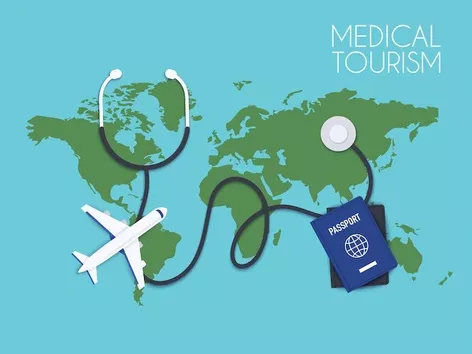Health Insurance and Visa for Treatment in Spain: current rules
Table of contents
- Public healthcare system in Spain
- Which foreigners are entitled to free public health insurance in Spain?
- What does the Spanish public healthcare system cover?
- What are the limitations of public health care in Spain?
- Private health insurance in Spain
- Advantages of the Spanish private health insurance system
- How much does private health insurance cost in Spain?
- Visa for medical treatment in Spain
- Types of Spanish medical visas
- Required documents for obtaining a Spanish visa for medical treatment
- How to apply for a Spanish medical visa?

Spain offers one of the best healthcare systems in Europe, combining public and private healthcare. Find out how to get healthcare in Spain, what rights foreigners have for free treatment, and the specifics of health insurance in the country
Spain is known for its excellent healthcare system and is ranked among the best in Europe in terms of the level of development of the system. The World Health Organization (WHO) determines the quality of the Spanish healthcare system, which is why it continues to be a popular destination for medical tourism, especially among citizens of Ukraine, Morocco, Italy and Algeria.
Spain has a dual healthcare system: public and private. We will tell you about the features of each of them and how an expat can get medical care in Spain in this article.
Choose a reliable health insurance policy on the Visit World portal to protect yourself from unforeseen expenses during your move. Support from a trusted insurance agent with a guaranteed payout in just a couple of clicks!
Public healthcare system in Spain
The public system, known as the National Health System (SNS), is financed mainly through taxes and offers free or low-cost services to residents. Approximately 90% of the population uses the public healthcare system, while about 26% choose private health insurance.
Which foreigners are entitled to free public health insurance in Spain?
- Legal residents who are officially employed – both employees and self-employed. This right also extends to their family members – spouses and children.
- Children, pregnant women and students under 26 years of age are entitled to healthcare without additional requirements.
- People who have recently separated from a partner registered with the Spanish social security system.
- Recipients of state child benefits.
- Pensioners receiving a state pension.
- EU and EFTA citizens (Iceland, Liechtenstein, Norway, Switzerland) have access to free healthcare based on the European Health Insurance Card (EHIC).
- Illegal migrants can also receive basic healthcare. However, they are required to pay at least 40% of the cost of prescribed medication.
What does the Spanish public healthcare system cover?
Under the public health insurance policy, an expat can claim: primary care, childbirth, physiotherapy, disease prevention and diagnosis, rehabilitation and emergency care.
What are the limitations of public health care in Spain?
- Dental care: not covered by the SNS, people must pay for it out of pocket or through private insurance.
- Mental health services: public mental health services are underfunded, leading to long waiting times and limited access.
- Waiting times: specialist appointments and elective surgeries can have long waiting times in the public system.
Private health insurance in Spain
Private health care offers faster access, shorter waiting times and a wider range of services. It is particularly popular with foreigners and those seeking specialized treatment.
Advantages of the Spanish private health insurance system
- Faster access: no referral required, direct access to specialists.
- Comfort: Private rooms and amenities.
- English-speaking staff: More common in private facilities.
- Extras: Dental, mental health and alternative treatment coverage.
How much does private health insurance cost in Spain?
- Monthly premiums: Between €50 and €200, depending on coverage and provider.
- Popular providers: Asisa, Sanitas, DKV, Adeslas and Feather.
Visa for medical treatment in Spain
If a foreigner plans to travel to Spain for medical treatment, they will need to obtain a visa. The specific type of visa depends on the purpose and length of stay.
Types of Spanish medical visas
- Short-stay Schengen visa: for stays of up to 90 days in a 180-day period.
- Long-stay visa: for stays of more than 90 days, including student, work or resident visas.
Required documents for obtaining a Spanish visa for medical treatment
- Valid passport.
- Completed visa application form.
- Recent passport-sized photographs.
- Proof of financial means.
- Travel insurance covering medical expenses.
- Medical certificate or confirmation of appointment, if any.
How to apply for a Spanish medical visa?
Step 1 – Prepare your documents.
Step 2 – Make an appointment to submit your documents at a visa application center or Spanish consulate.
Step 3 – Complete the application form and print 2 copies.
Step 4 – Pay the visa fee as required.
Step 5 – Submit your documents and attend a visa interview, if required.
Step 6 – Wait for a decision (up to 15 business days).
Step 7 – Obtain your visa and plan your trip to Spain for treatment.
Spain offers a high-quality healthcare system with both public and private options. Foreigners seeking medical treatment should ensure that they have adequate health insurance and meet the visa requirements. Private health insurance is often preferable for faster access and additional services not covered by the public system.
Order a guide for treatment on the Visit World portal - a convenient assistant for anyone planning a medical trip to Spain. In it you will find: up-to-date information on visa fees and application processing times, a complete list of required documents, step-by-step instructions for obtaining a medical visa - from filling out the application form to passing the interview, as well as tips and life hacks for a comfortable stay in the country.
Plan treatment easily - with Visit World!
Reminder! Canada in 2025 continues to be one of the most attractive destinations for medical tourism thanks to a combination of quality, innovation and accessibility. We have already told you how the healthcare system in Canada is structured, why the country attracts foreigners for treatment, which clinics are the most popular among medical tourists and other important information.
Products from Visit World for a comfortable trip:
Checklist for obtaining a visa and necessary documents in Spain;
Legal advice on immigration to Spain;
Travel insurance for foreigners in Spain;
Medical insurance all over the world.
We monitor the accuracy and relevance of our information, so if you notice any errors or inconsistencies, please contact our hotline.
Recommended articles
2 min
Treatment
Andorra's medical system: how the healthcare system works and the advantages and disadvantages
Andorra's healthcare system is known for its high quality of service and efficient organization. Learn how universal health insurance, highly qualified medical professionals, and international cooperation contribute to providing reliable medical care for citizens and tourists, as well as the advantages and disadvantages of the country's healthcare system
26 kwi. 2025
More details2 min
Treatment
The UK Care Worker Visa allows skilled workers to work in the healthcare and care sector. Find out what the Care Worker Visa is, who can get it, the requirements for candidates, the documents required for application, the visa application process and changes to the rules from 2025
20 mar. 2025
More details2 min
Treatment
Vietnam is developing as a center for medical tourism and attracts more and more foreigners for treatment every year. Learn about popular medical services in Vietnam, as well as the advantages and disadvantages of treatment in the country
30 mar. 2025
More details1 min
Treatment
Physiotherapy Internships Abroad: Exploring the World While Gaining Experience
A physiotherapy internship abroad is a great opportunity to advance your career. Learn why you should do an internship abroad, what are the most popular internship destinations, including Asia, Africa, Oceania, and Europe, and get helpful tips on choosing an internship program and financial planning
31 mar. 2025
More detailsAll materials and articles are owned by VisitWorld.Today and are protected by international intellectual property regulations. When using materials, approval from VisitWorld.Today is required.
